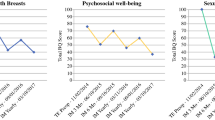Abstract
OBJECTIVE: To examine factors associated with variation in the quality of care for women with 2 common breast problems: an abnormal mammogram or a clinical breast complaint.
DESIGN: Cross-sectional patient survey and medical record review.
SETTING: Ten general internal medicine practices in the Greater Boston area.
PARTICIPANTS: Women who had an abnormal radiographic result from a screening mammogram or underwent mammography for a clinical breast complaint (N=579).
MEASUREMENTS AND MAIN RESULTS: Three measures of the quality of care were used: (1) whether or not a woman received an evaluation in compliance with a clinical guideline; (2) the number of days until the appropriate resolution of this episode of breast care if any; and (3) a woman’s overall satisfaction with her care. Sixty-nine percent of women received care consistent with the guideline. After adjustment, women over 50 years (odds ratio [OR], 1.58; 95% [CI], 1.06 to 2.36) and those with an abnormal mammogram (compared with a clinical breast complaint: OR, 1.75; 95% CI, 1.16 to 2.64) were more likely to receive recommended care and had a shorter time to resolution of their breast problem. Women with a managed care plan were also more likely to receive care in compliance with the guideline (OR, 1.72; 95% CI, 1.12 to 2.64) and have a more timely resolution. There were no differences in satisfaction by age or type of breast problem, but women with a managed care plan were less likely to rate their care as excellent (43% vs 53%, P<.05).
CONCLUSIONS: We found that a substantial proportion of women with a breast problem managed by generalists did not receive care consistent with a clinical guideline, particularly younger women with a clinical breast complaint and a normal or benign-appearing mammogram.
Similar content being viewed by others
References
Diercks DB, Cady B. Lawsuits for failure to diagnose breast cancer. Surgi Oncol Clin Am. 1994;3(1):125–36.
Schaefer MA, ed. Risk Management and Breast Cancer. Vol 19. Cambridge, Mass; 1998.
Smith B. Algorithms for management of common breast complaints. Forum: Harvard Risk Management Foundation. July 1995:1–5.
Hosmer DW, Lemeshow S. Applied Logistic Regression. New York, NY: John Wiley and Sons; 1989.
Cox DR. Regression models and life tables. J R Stat Soc B. 1972;34:187–220.
Dewar MA, Love N. Legal issues in managing breast disease. Postgrad Med. 1992;92(5):137–51.
Spratt JS, Spratt SW. Medical and legal implications of screening and follow-up procedures for breast cancer. Cancer. 1990;66(6 suppl):1351–62.
Plotkin D, Blankenberg F. Breast cancer: biology and malpractice. Am J Clin Oncol. 1991;14(3):254–66.
Moskowitz M. Breast cancer: age-specific growth rates and screening strategies. Radiology. 1986;161:37–41.
Kerlikowske K, Grady D, Barclay J, Sickles EA, Ernster V. Effect of age, breast density and family history on the sensitivity of first screening mammography. JAMA. 1996;276(1):33–8.
Localio AR, Lawthers AG, Brennan TA, et al. Relation between malpractice claims and adverse events due to negligence. N Engl J Med. 1991;325:245–51.
Brennan TA, Localio AR, Leape LL, et al. Identification of adverse events occurring during hospitalization: a cross-sectional study of litigation, quality assurance, and medical records at two teaching hospitals. Ann Intern Med. 1990;112:221–6.
Elmore JG, Barton MB, Moceri VM, Polk S, Arena PJ, Fletcher SW. Ten-year risk of false positive screening mammograms and clinical breast examinations. N Engl J Med. 1998;338(16):1089–96.
Kerlikowske K, Grady D, Barclay J, Sickles EA, Ernster V. Likelihood ratios for modern screening mammography: risk of breast cancer based on age and mammographic interpretation. JAMA. 1996;276:39–43.
Cady B, Steele GD Jr, Morrow M, et al. Evaluation of common breast problems: guidance for primary care providers. CA Cancer J Clin. 1998;48(1):49–63.
King JY. Practice guidelines and medical malpractice litigation. Med Law. 1997;16(1):29–39.
Chang SW, Kerlikowske K, Napoles-Springer A, Posner SF, Sickles EA, Perez-Stable EJ. Racial differences in timeliness of follow-up after abnormal screening mammography. Cancer. 1996;78:1395–402.
Howard J, Hankey BF, Greenberg RS, et al. A collaborative study of differences in the survival rates of black patients and white patients with cancer. Cancer. 1992;69(9):2349–60.
Eley JW, Hill HA, Chen VW, et al. Racial differences in survival from breast cancer. JAMA. 1994;272:947–54.
Mandelblatt J, Andrews H, Kerner J, Zauber A, Burnett W. Determinants of late stage diagnosis of breast and cervical cancer. Am J Public Health. 1991;81:646–9.
Author information
Authors and Affiliations
Corresponding author
Additional information
This work was supported by a grant from the Harvard Risk Management Foundation. Dr. Haas was the recipient of a Clinical Investigator Award from the National Institute of Child Health and Human Development (K08-HD01029) when this work was conducted.
Rights and permissions
About this article
Cite this article
Haas, J.S., Cook, E.F., Puopolo, A.L. et al. Differences in the quality of care for women with an abnormal mammogram or breast complaint. J GEN INTERN MED 15, 321–328 (2000). https://doi.org/10.1046/j.1525-1497.2000.08030.x
Issue Date:
DOI: https://doi.org/10.1046/j.1525-1497.2000.08030.x



